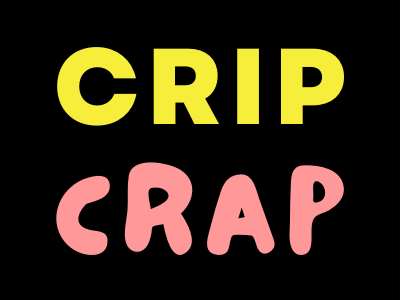“Thunder Rolls” – Indie Folk Anthem to an Accessible Future
By Kieran Marshall
I can tell you from experience that, within queer and trans circles, we have no shortage of conversation about the powerful role music occupies in our lives. For many, it’s the portal where we catch our earliest glimpses into community–I can still picture all the scratches I put on my hometown library’s copy of the RENT soundtrack as a closeted teen. Leaner times. It’s a queer tradition, the way we hone our survival tools with art as the whetstone. So of course I was primed to wonder, when I came into my disability identity as an adult, where the soundtrack for this part of my experience was. It’s common knowledge that Beethoven was Deaf. Stevie Wonder and Ray Charles are legends in their own right, blind musicians who shaped the canon of modern music. But my roots in punk and DIY spaces had me craving a more community-minded, “by us, for us” approach, one that proved harder to satisfy. Since then, I’ve had my ear pressed to the ground for work by contemporary disabled artists that speaks authentically to our experiences, without packaging them as tragedies or an inspiration to nondisabled audiences. This has led to some exciting discoveries, but my current favorite among them isn’t a chart-topper or a lofty classical composition. It’s a simple indie folk tune called “Thunder Rolls”.
Written by Kimya Dawson (of “Juno” soundtrack fame), Clyde Petersen, and Kalyn Heffernan of Wheelchair Sports Camp, “Thunder Rolls” might bring up descriptors like charming or cute at first pass. Underneath, though, is a swaying anthem to disabled joy, grief, and survival. It was released at the height of the pandemic, with each artist’s contribution recorded remotely before being assembled and mixed from a blanket fort in Dawson’s bed. The blanket fort workplace – there’s a disabled tradition with deep roots. The instrumentation feels like a soft bed itself, lulling listeners with acoustic strums, soft chimes, and some well-placed kazoo from Sean Bonnette of the iconic folk punk outfit AJJ. By contrast, the lyrics step forward with a vulnerable willfulness that fans of Dawson’s other work will recognize. The lines, “Keep marching if you can, or walk like thunder/but don’t forget that thunder rolls” reference the unforgettable recovery ballad “Walk Like Thunder” from Dawson’s 2011 album Thunder Thighs (content warning for frank depictions of addiction, illness and death in the original track). Just like its predecessor, “Thunder Rolls” is a powerful survival imperative for those living at the margins of a world that was not built for them. I’d say it even goes a step farther, layering its pathos with a cheerful practicality. In a later verse, Dawson’s teenage daughter Panda actually gives listeners a primer on proper ramp-building when she sings, “One foot long for every inch of rise/That’s the math we use to make sure everyone can come inside.” It’s an unexpected addition for its sheer usefulness. From now on, if I ever find myself needing to put a ramp together on short notice, this verse is what I’ll be humming as I measure.
But it was Heffernan who penned the song’s take-home line: “There’s a stairway to heaven, so how the hell we gonna get in?” I remember the involuntary mhmm I released to my empty apartment the first time I heard it. It wasn’t until later, digging into Wheelchair Sports Camp’s other releases, that I realized the phrase had been repurposed from their 2016 hip hop earworm “Hard Out Here for a Gimp”. Learn from my mistake: don’t sleep on Wheelchair Sports Camp. Emcee Kalyn Heffernan has charisma, delivering godlike rhymes with a shit-talking playfulness that complements Kimya’s wry indie style. The two are a match made in stairless heaven, and I would love to see more collaborations between them in the future.
While musicians working together is a theme as old as the art form itself, this concept of collaboration is one I’ve rarely seen more powerfully wielded than within a group of disabled artists and friends. Toward the conclusion of “Thunder Rolls”, as the vocalists of each verse reprise their own lines into a swelling call to action for accessibility, I can’t help but hear their layered voices as an ode to the interdependence that’s so crucial to the disability community. The earnest moment is a sum greater than its parts, where each voice contributes an irreplaceable and unique melody. Vocal contributions to the track were made by the three writers, Bonnette, and Panda Dawson. The song’s instrumentation also features Kimya Dawson and Preston Bryant on guitars, Petersen on piano, Mark Glick on cello and bass, and Bradley Mehlenbacher on drums.
Within marginalized communities, including the disability community, the necessity of our musical expression can’t be overstated. The art we create is as varied and essential as the bodies and minds that create it. I’m looking forward to discovering more disabled musicians putting out work that centers our experiences, and I’m always seeking to broaden my horizons of genre and taste as I go. As for “Thunder Rolls”, this gem is too precious for streaming, but you can find it over on Kimya Dawson’s Bandcamp page. So hop in your blanket fort, throw on this delightful track, and let it remind you to keep fighting for a future where everyone can come inside.
Kieran Marshall (he/they) made his solo vocal debut at age 3 when, uninspired by his small town church choir’s Sunday performance, he stepped calmly off the risers to announce, “I’m not singing!” between every phrase of “Amazing Grace”. Lauded as an “experimental triumph” by the church ladies over luncheon, his additions have since been canonized in the United Methodist Hymnal. At age 26, he lives in Chicago while pursuing a degree in mortuary science. He is guardian to two cats and six tarantulas, a duty he does not take lightly. He can (sometimes) be found on Instagram @vim.n.vigor.

